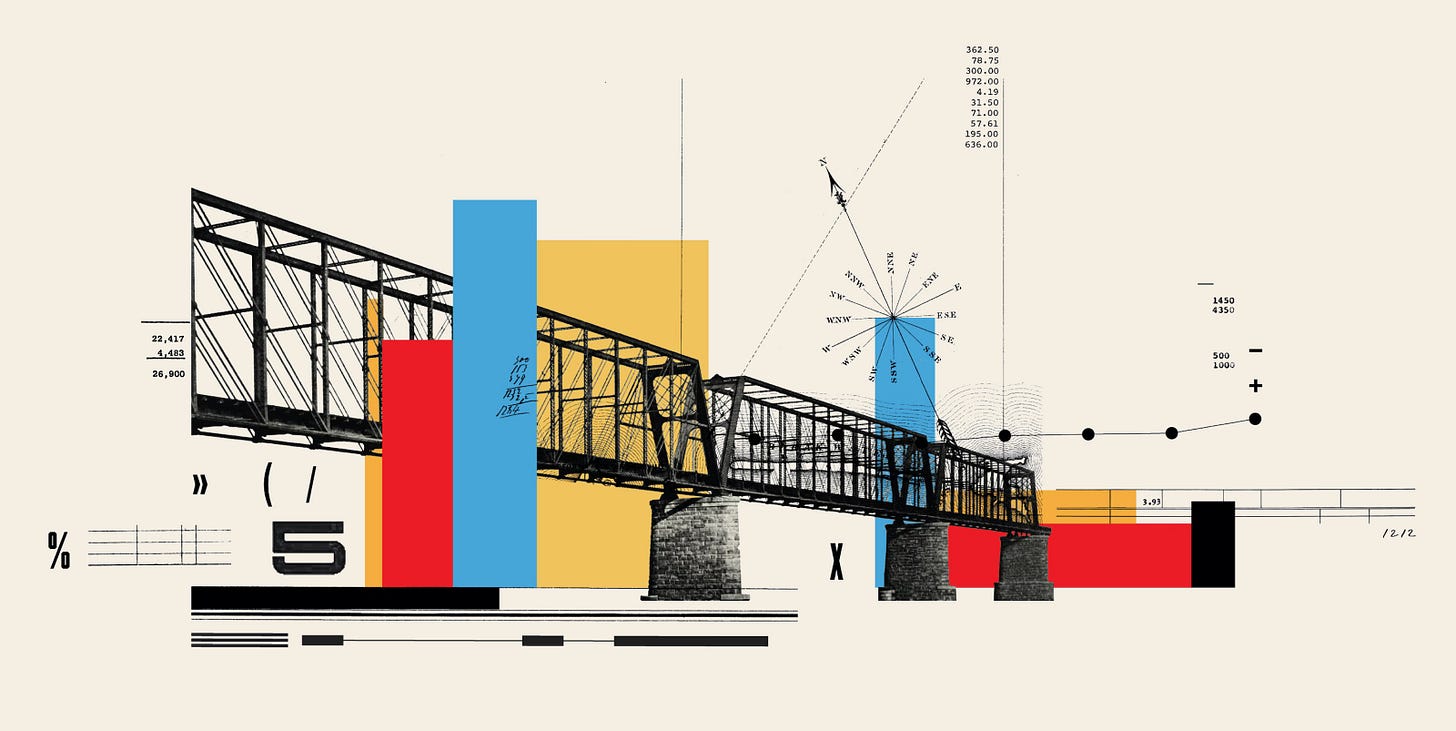Designing an Economy Like an Ecologist
How complexity thinking could reboot our approach to public policy

My collaborator Oshan Jarow and I recently made public the Library of Economic Possibility, a knowledge tool for economic ideas just outside the Overton window. LEP is motivated by our belief that the economy should be understood as a complex adaptive system and economic policy as a design problem within it. It’s also a reaction to a deep structural problem with mainstream economic thought.
Economic thinking has long been dominated by two oversimplifications that have shaped the modern world.
Oversimplification #1: The economy can be centrally planned
One has already collapsed; the economic ideas of Marx and especially Lenin, who sought an egalitarian society through the centralized control of the economy. In their effort to eliminate the capitalist class, they made a fatal error in their descriptive model of how economies work.
In reality, most of the relevant knowledge needed to coordinate economic activity is distributed throughout the system. How many nails to produce each month, for example, depends on dispersed information that planners cannot access. The inefficiencies of central planning make it unsustainable.
Friedrich Hayek described this dynamic lucidly:
"The marvel is that in a case like that of a scarcity of one raw material, without an order being issued, without more than perhaps a handful of people knowing the cause, tens of thousands of people whose identity could not be ascertained by months of investigation, are made to use the material or its products more sparingly; that is, they move in the right direction."
—Friedrich Hayek, The Use of Knowledge in Society, 1945
Hayek’s insight into decentralized knowledge in markets helps explain why free market systems outlasted communist planning.
Unfortunately, Hayek’s insight was overshadowed by the second oversimplification.
Oversimplification #2: The economy is a static model
The impulse to exert control also underlies this second misconception, which continues to shape policy today. In the late 1800’s, economists like William Stanley Jevons and Léon Walras sought to model the economy as a mathematical equation.
Physics is rich with elegant mathematical equations, so these economists took them. I mean this quite literally. The neoclassical economic model of general equilibrium, which can be found in nearly every economics textbook of the last century, was lifted from chapter two of French mathematician Louis Poinsot's Elements of Statics (1803) by Léon Walras. Walras made this model the centerpiece of his Elements of a Pure Economics in 1872, and it spread rapidly in the decades that followed.
Our modern economic system relies on a 220-year-old physics model that was already rendered obsolete among physicists by new understandings of entropy and thermodynamic behavior at the time that Walras was taking it to Kinko's.
However, in order to turn the economy into a simple static model, neoclassical economists had to make a few assumptions (the first of which effectively erases Hayek's1 insight):
Everyone has perfect information at all times.
People always act rationally and logically.
Everyone has access to at least some amount of every possible good and service.
There are futures markets for everything.
The probabilities of all future events are known with certainty.
There is no social or collective agency, no shared goals or common interests—there is only the individual.
Why would the backbone of modern economics accept these obvious distortions of the real world?
Because without these assumptions, the math doesn't work!
The neoclassical model’s assumptions take it to a radical end: If markets always find balance, then the sole role of policy must be to cease meddling with their course. Simply put, we must eliminate all forms of intervention. But in mistaking model for reality and logical extreme for pragmatic mandate, this conclusion casts a spell that has cost us dearly.
Beginning in the 1970’s, this ‘free market fundamentalism’ drove deregulation, privatization, attacks on unions, financialization, and cuts to public services.
The previous economic model had its own clear failings, but if economic growth, shared prosperity, and business dynamism were the goal of the new system, then this project has failed. Economic growth has slowed to a crawl, inequality has skyrocketed, and we now have more businesses dying than being born. Rather than tending towards equilibrium, a strict adherence to non-interventionism has led to a new form of consolidated control by rent-seekers in the private sector.
High modernist economics
Let’s turn to Hayek again.
“The curious task of economics is to demonstrate to men how little they really know about what they imagine the can design.”
—Friedrich Hayek, The Fatal Conceit, 1988
There’s an irony in Hayek’s critique of economic interventionism, since the free market fundamentalism that he supported exhibits the very same ‘design’ impulse he criticized.
‘Design’ for Hayek referred to the dominant approach of his era, high modernism.
High modernism is a design paradigm characterized by:
Strong belief in scientific and technological progress. High modernists held a utopian faith in experts and intellectuals to use scientific knowledge to master nature and society.
Attempts to control and redesign complex systems. High modernism tried to impose order on organic or historical environments using engineering-inspired methods to rationally plan and optimize systems.
Disregard for context and specificity. A "one-size-fits-all" approach ignored local history, culture, geography, and differences in favor of universal “scientific” principles.
Reliance on legibility and efficiency. The goal was to make systems more transparent and efficient via simplification.
While free markets are seen as the opposite of communism (which clearly exhibits the failure patterns of high modernism), a modest dive into the epistemic origins of Hayek’s free market fundamentalism reveals it to carry all of the same high modernist traits. Free market fundamentalism is yet another flavor of high modernist economics.
Communism
Perceives itself as scientific, is actually based on the pseudoscience of historical materialism
Technocratic view of economics as an engineering problem
Believes a pure state-planned economy can achieve maximum efficiency
Built on numerous simplifying assumptions of how the economy works
Free market fundamentalism
Perceives itself as scientific, is actually based on the pseudoscience of the neoclassical model
Technocratic view of economics as an engineering problem
Believes a pure market-driven economy can achieve maximum efficiency
Built on numerous simplifying assumptions of how the economy works
The core problem with both systems is that they aren’t based on reality. They are simplified models derived from idealized blank-slate visions of what that reality ought to look like, imposed from above on the rich complexity of real economies.
While it makes for an elegant model, economic equilibrium doesn’t actually exist in the real world. The map is not the territory and the model is not the economy. While markets have real strengths, real world economies do not follow a simple physics model’s rules.
As economist Steve Keen observes,
“There is one striking empirical fact about this whole literature, and that is that there is not one single empirical fact in it. The entire neoclassical theory of consumer behavior has been derived in ‘armchair philosopher’ mode, with an economist constructing a model of a hypothetical rational consumer in his head, and then deriving rules about how that hypothetical consumer must behave.”
— Steve Keen, Debunking Economics
How do you get a healthy ecology?
Fortunately, high modernism is not the only approach to design, nor is armchair philosophy the only approach to economics.
The prescriptions of central control or pure non-intervention are naïve responses to unrealistic economic models. Even free markets are designed — they require institutions to create, regulate, and police them.
In 2019 I attended a symposium on complexity economics at the Santa Fe Institute, where Eric Beinhocker, author of The Origin of Wealth, made a comment that framed the problem beautifully:
“Asking ‘Do you want more market or more state?’ makes about as much sense as asking ‘Do you want more plants or more animals?’ The real question is ‘How do you get a healthy ecology?’”
—Eric Beinhocker, SFI Complexity Economics Symposium, 2019
Like ecologies, economies are complex adaptive systems. They exhibit feedback loops, delays, adaptation, path dependence, nonlinearity, emergent phenomena and — importantly — people.
Economics is a social science. As the renowned physicist Murray Gell-Mann once quipped, “Imagine how hard physics would be if electrons could think!”
So how do we achieve a healthy ecology?
While no single measure can adequately describe a complex system, ecologists generally assess the health of an ecosystem with a few key indicators:
Biodiversity
The variety of species present and their relative abundances. Higher biodiversity indicates a healthy, stable ecosystem.
In economics, we might consider the ‘biodiversity’ of businesses. High market concentration suggests problems.
Nutrient Cycling
The efficient circulation of nutrients like nitrogen, carbon, and oxygen through the system. If nutrients are accumulating or being depleted, it may indicate the system is out of balance.
In economics, we might consider the velocity of money. If capital is accumulating rather than cycling through the economy, imbalances may emerge.
Resilience
The ability of an ecosystem to withstand an exogenous disturbance, and then recover from it. Resilient, healthy ecosystems can handle stress without collapsing.
In economics, we might consider whether the economy can withstand a natural disaster or, say, a pandemic. As we’ve learned, hyper-efficient supply chains don’t fare well under stress.
Indicator Species
The presence, absence, or abundance of sensitive species are indicators of ecosystem health. Indicator species are the ecological ‘canary in the coal mine’. For example, mayflies are sensitive to water pollution, so their population declines indicate impending problems.
In economics, we might consider the presence of small businesses, young people, or artists in the economy. Their struggle or decline could signal problems with economic opportunity and vitality — just as the absence of mayflies signals pollution.
Far from mechanical equilibrium or precision-tooled growth, a complexity-oriented approach to public policy might track the economy’s more organic vital signs.
Complexity-based intervention
Ecologists take a nuanced, evidence-based approach to intervening in complex adaptive systems.
Consider their work on trophic cascades to increase biodiversity in Yellowstone park. By reintroducing grey wolves 70 years after they had been killed off, ecologists set off a chain reaction of ecological restoration. The wolves put the deer and elk population back in check, which made room for a resurgence of trees and vegetation. This increased the diversity of birds and increased the population of beavers, whose dams provided habitats for otters, muskrats, ducks, fish, reptiles and amphibians. The intervention even stabilized river banks and altered river behavior. A careful design intervention triggered self-reinforcing positive change, restoring ecosystem balance and a dramatically improving ecological health.
Other interventions include restoring mangrove forests in coastal wetlands to enable nutrient cycling and reduce fertilizer runoff, or creating wildlife corridors to connect fragmented habitats and boost biodiversity.
Ecologists developed these interventions through an empirical understanding of how ecologies work in the real world. They observed the dynamic behavior of food webs and ecological response to disturbances. They ran controlled and natural experiments, beginning with small-scale interventions, testing and evaluating before expanding the idea to larger ecosystems. Much like the systems they study, ecologists are adaptive and change their approach as they learn more about how the system behaves and responds to change.
Economic possibilities
I believe economic thinking would better support flourishing societies if it adopted ecologists’ approach to natural ecosystems. Fortunately, many economists are already doing the hard work of empirical research into potential interventions within the context of economic complexity and have been for quite some time. Rather than forcing a simple model on complex reality, they are building a nuanced understanding of the economy starting with observations in the real world.
For example, a 2019 study by Reimer, Guettabi, and Watson found that a universal $1,000 payment from the Alaska Permanent Fund — a natural experiment in basic income — decreases the probability of an Alaskan child being obese by as much as 4.5%. They estimate that a national expansion may therefore trigger self-reinforcing positive change resulting in medical cost savings of approximately $310 million.
Or consider the 2016 study that studied the effects of a land value tax in Harrisburg, Pennsylvania. In the period following the intervention, the number of vacant lots fell by 80%, the tax base rose from $212 million to $1.6 billion, and crime was cut in half.

Our mission at the Library of Economic Possibility (LEP) is to make the nuanced work of these economists more accessible to the public. By collecting and sharing studies on the real-world effects of new policy approaches — both successes and limits — LEP aims to help ground popular economic thinking in an empirical and pragmatic understanding of what might be possible amid complexity. From land value tax to worker codetermination, carefully designed economic interventions may trigger virtuous cycles of prosperity and resilience — if we are willing to experiment with a pragmatic eye towards ecological health.
The economy is not a machine to be programmed or a windup toy to be set loose, but a garden to be tended. Careful intervention informed by pragmatic learning can tip systems into virtual cycles that outstrip our narrower aspirations of control. It’s time to move past high modernist economics. The economy awaits the hands of humble student-stewards — willing not just to act on it, but to learn how it acts in turn.
Hayek is a complicated figure in economic history. Though he was heavily involved in the turn toward free market fundamentalism and is often associated with neoclassical economics, his ideas about distributed knowledge constitute an early understanding of the economy as a complex system. Accordingly, he believed that the economy was too complex for equilibrium analysis and that people do not necessarily maximize utility.








Hi Kasey, Steve Keen isn't exactly an unbiased critic of the economic establishment :) The story is way more nuanced than you present it; professional economists across all sectors (public, private, NGO, universities), not just in the US but worldwide, have been analyzing and modeling economic systems using a wealth of pragmatic approaches for many many decades now, using the "standard model" of general equilibrium as one of many conceptual frameworks rather than as gospel. Just as an example, from 2006-2010 I worked as an economic modeler for a Brazilian thinktank, working with and for multiple government organizations, large corporates and international organizations like the UN. The models we used included system dynamics (of Limits to Growth fame, originally inspired by population dynamics from ecology and first applied to economics in the 1960s); input-output models (which got Leontief a Nobel in 1973); game-theoretic models of auction pricing (Nobel in 2020), agent-based models (Nobel in 2005)... Hardly the picture of a Sauron-like economic fundamentalism that Keen and others paint.
Interestingly, many of these ideas came out of people, universities and thinktanks associated with the high-modernist era: system dynamics was born at MIT, game theory from von Neumann's wartime work at IAS and Rand Corporation, ABM also trace their origin from von Neumann... Indeed, one can fairly say that high modernism's emphasis on control and predictive power was exactly what led researchers in the 40s to 60s to invent what is now cybernetics, complexity theory and chaos theory, first in an attempt to get better at controlling and predicting and only later realizing that these were the wrong goals! This closely parallels the Hilbert program's search for the ultimate proof of the completeness of mathematics, which bred the beast that destroyed it: Kurt Gödel's incompleteness theorems.
This story is still going on, BTW. Come join us in the world of decentralized economics, you'll see lots of economic possibilities heavily inspired by complex adaptive systems that are just on the verge of becoming reality :)
[One last fun note: your library of economic possibilities includes the Georgist staple, the Land Value Tax. Did you know that this concept was independently proposed at around the same time as George by... Léon Walras?]
I was lucky enough to be exposed to critical thinking about economics in college: both my BSc and MSc were born out of a bunch of economics professors worried that the dot-com bubble might happen again because people wouldn't understand neither economics nor technology.
Half of my professors were economists and the other half were physicists and we went deep into breaking down models, from the static ones into the world of complexity theories.